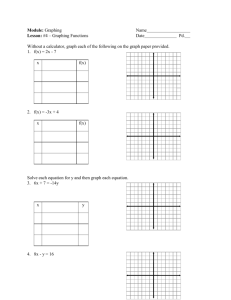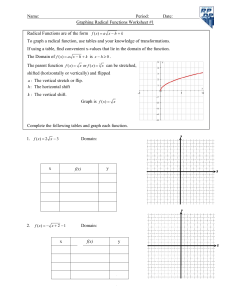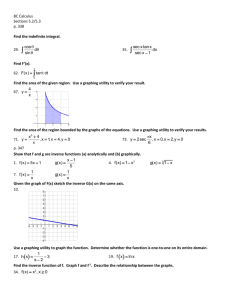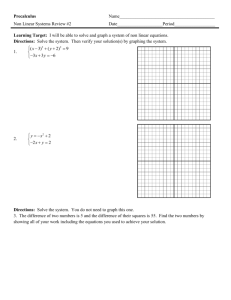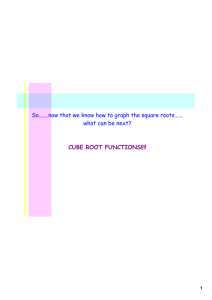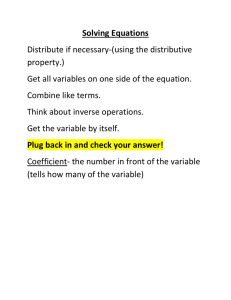Ch.7 Part 2 Notes
advertisement
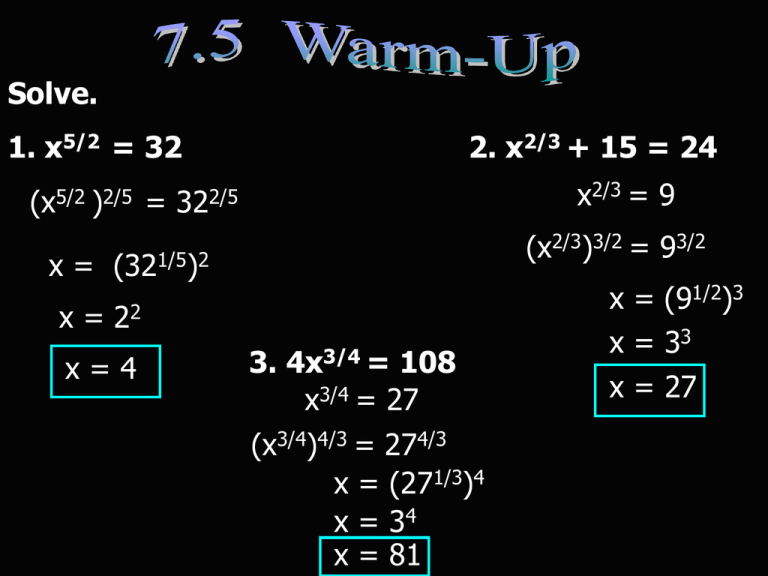
Solve. 1. x5/2 = 32 2. x2/3 + 15 = 24 x2/3 = 9 (x5/2 )2/5 = 322/5 (x2/3)3/2 = 93/2 x = (321/5)2 x = 22 x=4 3. 4x3/4 = 108 x3/4 = 27 (x3/4)4/3 = 274/3 x = (271/3)4 x = 34 x = 81 x = (91/2)3 x = 33 x = 27 7.5 Solving Radical Equations Objective - To be able to solve square root and other radical equations. State Standard 15.0 - Students will be able to solve radical expressions 7.5 Solving Radical Equations Example 1: Solve: 3 x–4=0 3 ( 3 x =4 3 x) = 4 3 x = 64 Example 2: Solve: 2x3/2 = 250 x3/2 = 125 (x3/2)2/3 = 1252/3 x = 125 2/3 x = (1251/3)2 x = 52 x = 25 Example 3: Solve: 3x + 2 – 2 x = 0 3x + 2 = 2 x ( 3x+2)2 = ( 2 3x + 2 = 4x 2 = x x )2 Example 4: Solve: x – 4 = 2x (x – 4)2 = ( 2x )2 x2 – 8x + 16 = 2x x2 – 10x + 16 = 0 (x – 2)(x – 8) = 0 x – 2 = 0 and x – 8 = 0 x = 2 and x = 8 7.6 Warm-Up Perform indicated operations 2 1.(2x+7) 2 4x +28x+49 2. 2 4 2 7.6 Function Operations Operations on Functions Operation Definition Example f(x)=2x, g(x)=x+1 Addition f(x)+g(x) 2x+(x+1) = 3x+1 Subtraction f(x) – g(x) 2x – (x+1) = x – 1 Multiplication (f(x))(g(x)) Division f(x) g(x) 2x(x+1) = 2x2 + 2x 2x (x+1) Example 1 Adding and Subtracting Functions f(x)=3x, g(x)=x+2 f(x)+g(x) f(x) - g(x) 3x+(x+2) 3x - (x+2) 4x+2 2x - 2 Example 2 Multiplication and Division Functions f(x)=3x, g(x)=x+2 (f(x))(g(x)) f(x)/g(x) (3x)(x+2) 2 3x +6x 3x/(x+2) f(x) = x + 4, g(x) = 3x h(x) = 2(f(x)) + 2(g(x)) h(x) = 4(f(x)) - 3(g(x)) h(x) = (2x+8) + (6x) h(x) = (4x+16) - (9x) h(x) = 8x + 8 h(x) = -5x + 16 f(x)=x-1, g(x)= 2x h(x)=3(f(x)) / 2g(x) h(x)=(-2(f(x))(g(x)) h(x)=3(x-1) / 2(2x) h(x)=(-2(x-1))(2x) h(x)=3x-3 / 4x h(x)=(-2x+2)(2x) 2 -4x + 4x Composition of two functions The composition of the function f with the function g is: f(g(x)) or (f ο g)(x) This is read as: f of g of x Example 3a f(x) = 2x and g(x) = 3x + 1 f(g(x)) f(3x + 1) g(f(x)) g(2x) 2(3x + 1) 3(2x) + 1 6x + 2 6x + 1 Example 3b -1 f(x) = 3x and g(x) = 2x – 1 f(g(x)) f(2x-1) 3(2x-1) 3 2x-1 -1 Example 3c 3 f(x) = x and g(x) = x2 + 7 (g ο f)(2) g(f(x)) g(x3) g(23) g(8) 82 + 7 64 + 7 71 Evaluate the compositions if: f(x) = x + 2 g(x) = 3 h(x) = x2 + 3 1. f(g(x)) 2. h(f(x)) f(3) f(x) = x + 2 3+2 h(x + 2) h(x) = x2 + 3 (x + 2)2 + 3 x2 + 4x + 4 + 3 5 x2 + 4x + 7 3. h(f(g(x))) h(f(3)) h(3 + 2) h(5) 52 + 3 25 + 3 = 28 Goal - Find inverses of linear functions. State Standard 24.0 – Students solve problems involving inverse functions Solving for the Inverse STEP 1 Switch the “y” and the “x” values. STEP 2 Solve for “y”. Example 1: Find the inverse of 10y +2x = 4 10x + 2y = 4 2y = -10x + 4 2 2 y = -5x + 2 Answer: y -1 = -5x + 2 Example 2: Find the inverse of y = -3x + 6 x = -3y + 6 –6 –6 x – 6 = -3y –3 –3 y = (-1/3)x + 2 Answer: y -1 = (-1/3)x + 2 Example 3: Find the inverse of the function: f(x) = x5 y=x5 x=y5 5 f -1(x)= x = y 5 x 1) Identify the domain and range Input Output 2 3 5 -1 -2 6 Domain = -1, 2, 5 & 6 Range = -2 & 3 2) Graph y = -2x2 + 3 Objective- Students will learn to graph functions of the form y = a x – h + k and y = a 3 x – h + k. y y (1,1) (0,0) Domain: x > 0, Range: y > 0 (1,1) x (-1,-1) (0,0) x Domain and range: all real numbers Example 1 Comparing Two Graphs Describe how to create the graph of y = from the graph of y = x . x+2 –4 Solution h = -2 and k = -4 shift the graph to the left 2 units & down 4 units Graphs of Radical Functions To graph y = a x - h + k or y = a 3 x - h + k, follow these steps. STEP u Sketch the graph of y = a x or y = a 3 x. STEP v Shift the graph h units horizontally and k units vertically Example 2 Graphing a Square Root Graph y = -3 x–1+3. (1, 3) (0,0) (2,0) (1,-3) Solution 1) Sketch the graph of y = -3 x (dashed). It begins at the origin and passes through point (1,-3). 2) For y = -3 x – 1 + 3, h = 1 & k = 3. Shift both points 1 to the right and 3 up. On White Board Graphing a Square Root Graph y = 2 x–2+1. (3,3) (1,2) (2, 1) (0,0) Example 3 Graphing a Cube Root Graph y = 2 3 x+3–4. (1, 2) (0,0) (-1,-2) (-2,-2) (-3,-4) (-4,-6) Solution 1) Sketch the graph of y = 2 3 x (dashed). It passed through the origin & the points (1, 2) & (-1, -2). 2) For y = 2 x + 3 – 4, h = -3 & k = -4. Shift the three points Left 3 and Down 4. On White Board Graphing a Cube Root Graph y = 3 3 x – 2 + 1 (1, 3)(3,4) (0,0) (-1,-3) (2,1) (1,-2)
